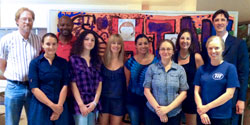
Community Immigration Law Center volunteers (from left) Tim O'Donnell, Nicole Wells, Jean-Rene Watchou, Julia Putinsev, Atty. Robin Dalton, Atty. Rocio Molina, Raluca Vais-Ottosen, Atty. Sarah Mazzie-Briscoe, Melissa Brown, and Atty. Grant Sovern.
Sept. 15, 2010 – In the last year, volunteers at the Community Immigration Law Center (CILC) in Madison have assisted 188 people from more than 50 countries, providing guidance on a wide range of issues related to U.S. immigration law. This pro bono project is a collaborative effort of local attorneys, immigration paralegals, U.W. Law School students, interpreters, and other volunteers. Start-up funding for the project was provided by a grant from the State Bar’s Pro Bono Initiative.
“We are very grateful for all the support that the State Bar has shown toward us,” said Jean-Rene Watchou, who serves as the project’s executive director. Nine immigration lawyers are regular volunteers contributing to the clinic’s success. They are joined by more than 30 law students, 15 interpreters, and other volunteers.
Reflecting on challenges the project faces, attorney Sarah Mazzie-Briscoe believes that “the biggest obstacle is our relative youth as an agency combined with suspicion that is deeply rooted, and justifiably so, in the immigrant community.” “We need more immigrants in the community, and more lawyers with clients who are immigrants, to be aware that we are a safe, caring, and highly qualified option where clients can get free, convenient help with immigration issues,” said attorney Grant Sovern.
There is no typical situation in the clinic. According to Mazzie-Briscoe, participants “pose a pantheon of issues/problems, and we receive a wide array of questions as a result.” Examples of the situations coming to the clinic include:
Community Immigration Law Center Attorney Volunteers
Robin Dalton
Sarah Mazzie-Briscoe
Rocio Molina
Grant Sovern
Stacy Tauber
Linda Clifford
Amanda Gennerman
Ramona Natera
Erin Murphy
Monica Santa Maria
Kashia Moua |
Many participants coming to the clinic are married or engaged couples. One spouse may be a U.S. citizen or lawful permanent resident and the other spouse is foreign-born. They are seeking information about the immigration process and any impediments to the foreign-born spouse’s eligibility to “adjust status” to lawful permanent residency through the U.S. citizen/LPR spouse.
Many participants seek information about petitioning/sponsoring other family members (siblings, parents, children) immigrating to the United States. With these inquiries come questions regarding the foreign-born person’s eligibility to immigrate to the United States, which can include issues regarding the foreign born person’s criminal history; immigration history; and social, political, health and military histories.
Some participants are “out of status,” meaning they entered the United States without documentation (or permission to enter) or they overstayed a temporary, non-immigrant visa. They typically want to know if there are any legal steps they can take to “fix” or legalize their status.
Lawful permanent residents are frequent clinic visitors as well. They may wish to renew their status, apply to become a naturalized citizen, or assess the impact of a criminal conviction on their current status. These people want guidance on the process, wait times, application completion, and eligibility requirements.
Volunteers also field questions regarding removal/deportation proceedings. Some people have fled their country of origin due to persecution or fear of persecution, and they are seeking information regarding asylum law and eligibility to remain in the United States.”
Related: Grants available for pro bono legal assistance projects, application deadline – Nov. 30, 2010
